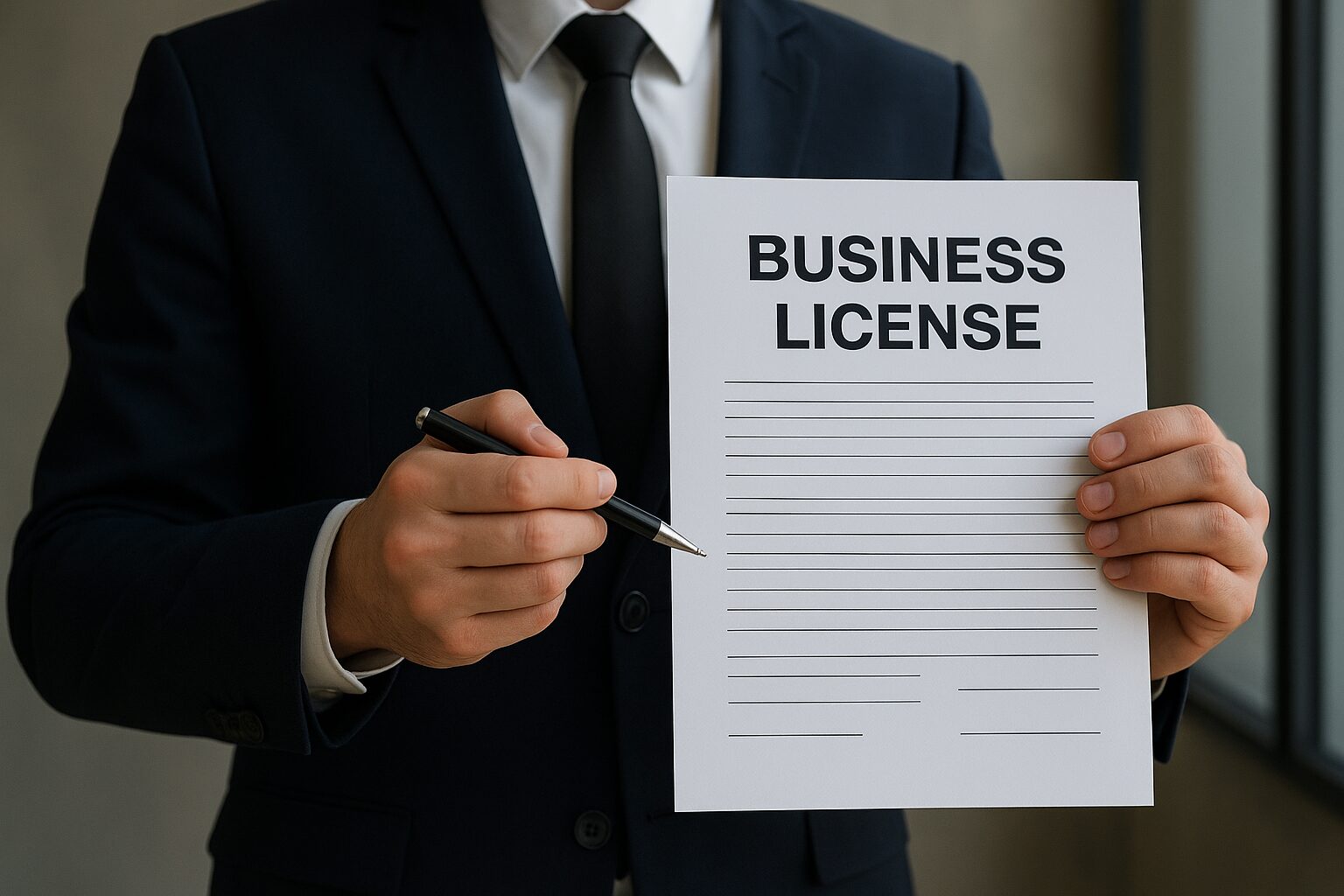Starting a business in 2025 is more exciting than ever, but one thing remains essential — securing a business license. Whether you’re launching a physical store, an online shop, or a professional service, you need a valid license to operate legally.
A business license serves as your legal permission to run a business within your city, state, or country. It helps local governments track business activities, ensures tax compliance, and protects consumers.
In 2025, staying compliant with business licensing regulations is more important than ever. Governments are tightening monitoring systems, and unlicensed businesses risk penalties or closure. This guide will walk you through how to apply for, renew, and maintain your business license smoothly — so you can focus on growing your business.
What Is a Business License?
A business license is an official document issued by a government authority that allows you to conduct business legally in a particular area. It verifies that your company meets local, state, and federal requirements.
Purpose of a Business License
- To identify your business for tax and regulatory purposes
- To ensure your operations follow zoning and safety rules
- To protect customers and maintain fair competition
Types of Business Licenses
- Local Licenses – Issued by city or municipal offices. Common for restaurants, salons, or retail stores.
- State Licenses – Required for certain professions like real estate, healthcare, or construction.
- Federal Licenses – Needed for industries regulated by national agencies (e.g., broadcasting, agriculture, or firearms).
Industries Requiring Special Permits
- Food and beverage (health permits)
- Transportation and logistics (vehicle permits)
- Finance (money service business registration)
- Construction (contractor license)
- E-commerce (online business permits and tax registrations)
Why You Need a Business License
Having a business license isn’t just about following the law — it’s about building trust and credibility.
1. Legal Requirement and Compliance
Operating without a license can lead to hefty fines or even business closure. Local governments require every business — even home-based or online — to register officially.
2. Business Credibility
A licensed business is more trustworthy. Customers, suppliers, and investors are more likely to work with you when they see you’re legitimate.
3. Tax and Financial Benefits
Your license allows you to pay taxes properly and access business loans or government support programs.
4. Protection and Peace of Mind
Licensing protects you from legal issues, giving you peace of mind as you scale your operations.
How to Apply for a Business License in 2025
Getting your business license may seem complicated, but it’s actually straightforward when you follow the right steps.
Step 1: Determine the Type of License You Need
Different businesses require different types of licenses. Check your local government’s website or business registration portal to identify which ones apply to your business type.
Step 2: Prepare the Necessary Documents
Gather all required paperwork before applying. Most offices require:
- Business registration or certificate of incorporation
- Tax Identification Number (TIN)
- Proof of address or lease agreement
- Valid IDs of business owners
- Zoning clearance (if you have a physical location)
Step 3: Submit Your Application
Apply online or in person at your city hall, municipal office, or relevant state agency. Many governments now allow digital applications for faster processing.
Step 4: Pay the Required Fees
License fees vary depending on your business type and location. On average, small businesses pay between $50 to $500 for initial registration.
Step 5: Wait for Approval
Processing time can range from a few days to a few weeks. Once approved, you’ll receive your official business license certificate.
Visual Example: Average Business License Processing Times (2025)
| Business Type | Average Approval Time | Estimated Cost |
|---|---|---|
| Small Retail Store | 5–7 business days | $80–$150 |
| Online Business | 3–5 business days | $50–$100 |
| Food Service | 10–15 business days | $100–$500 |
| Construction/Real Estate | 7–10 business days | $150–$300 |
Common Challenges
- Missing documents or incorrect information
- Applying under the wrong category
- Not knowing which agency to contact
- Delays during busy renewal seasons
Business License Renewal Process
Your business license isn’t a one-time task — it needs renewal, usually every year or two, depending on your region.
When and How Often to Renew
Most business licenses must be renewed annually. Check your license’s expiration date to avoid penalties.
Renewal Requirements
You’ll generally need:
- Your existing business license number
- Updated business details (if any changes occurred)
- Renewal application form
- Payment for renewal fees
How to Avoid Penalties
- Set calendar reminders for renewal deadlines
- Update any business information promptly
- Renew at least 30 days before expiration
Staying Compliant with Business License Regulations
Compliance is more than getting your license — it’s maintaining it properly.
1. Follow Local and National Laws
Stay updated on new business regulations in 2025. Many governments now require environmental compliance or data privacy documentation.
2. Update Your License After Business Changes
If you move locations, change business owners, or expand your services, update your license immediately to avoid issues.
3. Maintain Accurate Records
Keep copies of your license, permits, and renewal receipts. These are often required for tax filing or business verification.
4. Conduct Regular Compliance Checks
Perform an annual review to ensure all licenses and permits are current.
Common Mistakes to Avoid
Even experienced entrepreneurs make errors when managing licenses. Avoid these pitfalls:
- Applying for the Wrong License Type
Each business category has different requirements. Double-check before applying. - Missing Renewal Deadlines
Late renewals may result in penalties or temporary business suspension. - Not Updating Business Information
Any changes in ownership, address, or business activities should be reported. - Ignoring 2025 Regulatory Updates
Governments are introducing new online licensing systems and digital compliance checks. - Failing to Display the License
Always post your license where customers can see it — it builds trust.
Costs and Fees Involved
The cost of obtaining a business license varies by region, business type, and scale.
Average Fees by Business Type
| Business Type | Initial Application | Renewal Fee |
|---|---|---|
| Sole Proprietor | $50–$100 | $30–$70 |
| Corporation/LLC | $100–$300 | $80–$150 |
| Restaurant or Café | $200–$500 | $100–$300 |
| Construction/Contractor | $150–$400 | $100–$250 |
Other potential costs include:
- Health permits: $50–$200
- Environmental clearances: $100–$300
- Special permits (signage, fire, etc.): $50–$150
Frequently Asked Questions (FAQs)
1. Do online businesses need a business license?
Yes. Even if you sell online, most local governments require you to register your business for tax purposes.
2. Can I operate while waiting for my license approval?
In most cases, no. You must wait for your license to be officially issued before operating legally.
3. What happens if I forget to renew my business license?
Late renewal can lead to fines or temporary suspension. Some local offices may even revoke your license entirely if delays are long.
4. How long does it take to get a business license?
Approval typically takes between 3 to 15 business days, depending on your business type and the completeness of your documents.
5. Can I transfer my business license to another owner?
Yes, but you’ll need to apply for an ownership transfer and update all official records with the local licensing authority.
Conclusion
A business license is more than a legal requirement — it’s a sign of professionalism, accountability, and commitment to doing business the right way.
By following this 2025 guide, you can apply for, renew, and maintain your license confidently. Staying compliant protects your business from fines, builds customer trust, and positions you for long-term growth..
Disclaimer
This article is for informational purposes only and does not constitute legal or financial advice. Business license requirements may vary by country, state, or city. Always consult your local business licensing authority or a qualified professional before making business registration or compliance decisions.



